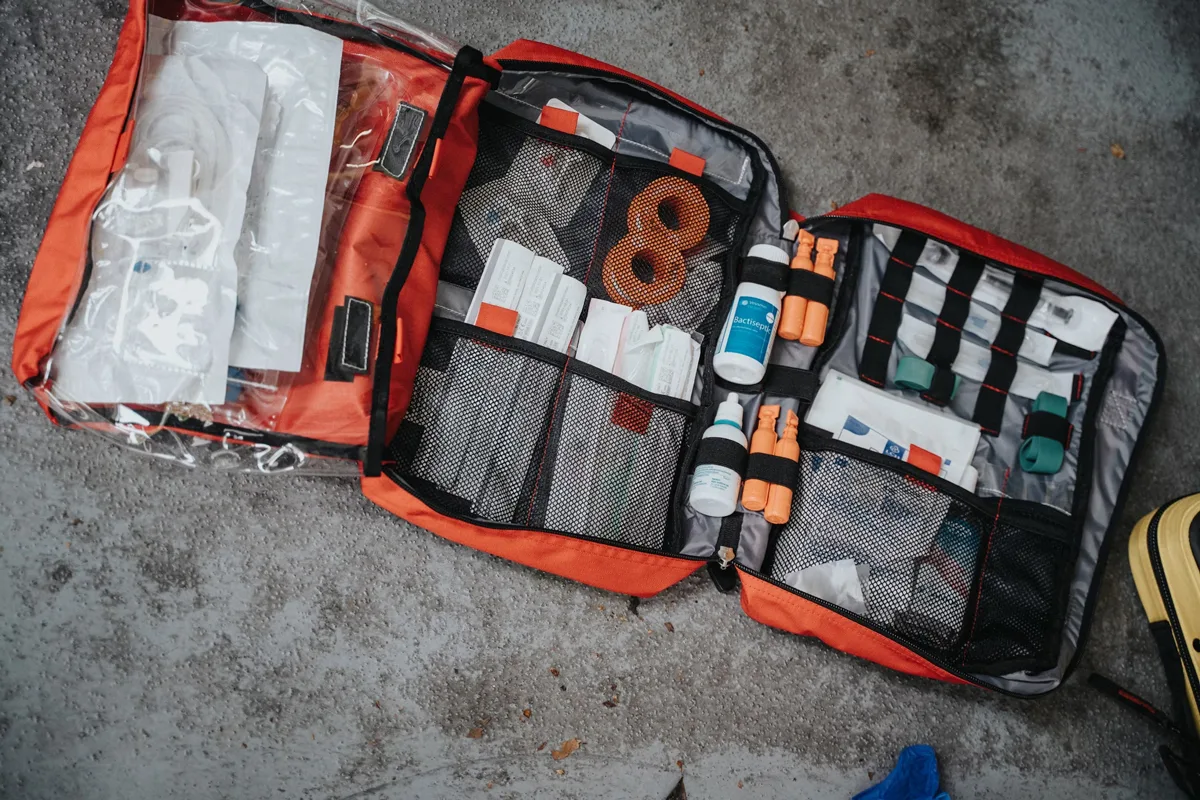Your plans to hit the road soon may have to include an emergency kit just to make sure you’re prepared to tackle any unforeseen bumps along your route. So, whether you’re planning on a cross-country adventure or just a weekend getaway, having a well-equipped road-preparedness kit can make all the difference.
It’s best that you keep this guide as your trusty sidekick to help make sure you’re ready to have everything under control.
Your Journey Preparedness Kit
1. Bring a Portable Jump Starter with an Air Compressor
Preparing your car and your emergency kit for the road trip ahead could be a hassle, especially if you can’t tick off the list of everything without going over your car’s load limit. So, everything has to be compact, like a portable jump starter.
It’s not just for jump-starting your dead batteries, but with a compressor, it can also pump up flat tires in a pinch. So, whether it’s a dead battery or a flat tire, having this superhero in your toolkit won’t get you stranded on a desert somewhere.
2. Fill Your First Aid Kit
Your first aid kit is quite essential for road trips, even if it’s not a long one, to provide you with immediate care in case of injuries. It can also address common mishaps and ensure your preparedness for unexpected situations.
So just pack items like:
- Bandages
- Antiseptic wipes
- Burn cream
- Handy blanket
- CPR mask
- Pain relievers
In some regions, they’re a requirement to bring along every time and can be customized for your specific needs, making it a dependable buddy in your journeys.
But while your first aid kit may give you some confidence to deal with minor injuries, it’s also best to make sure you’re prepared and will have an attorney’s legal advice for sideswipe car accident victims, should these incidents happen. It’ll really put your mind at ease if you have them on your contacts list, especially when planning for a long drive.
3. Pack Emergency Food Rations
You need food sustenance while on your road trip, apart from your usual lunch pack, you need emergency food rations for unforeseen delays or emergencies. Some non-perishable food bars or specially prepared ready-to-eat meals with long shelf life could give you the most needed nutrients and energy during long waits for assistance.
Your compact and easy-to-store provisions will help make sure you’re quite prepared for any situation, providing comfort and nourishment when you need them most on the road.
4. Bring a Reusable Water Filter
When you’re in an emergency and waiting for rescue, it’s best to keep yourself hydrated. And since clean drinking water is crucial, your portable water filter can turn any water source into safe drinking water.
5. Toss in a Solar-Powered Charger
Your lifeline to staying connected, a solar-powered charger helps you remain on your map no matter how remote your road trip may take you. It harnesses the sun’s energy to efficiently charge your devices, making sure they stay powered up even in the middle of nowhere.
From your smartphones to GPS devices, it’s a handy gadget that can keep everything juiced up, allowing you to navigate, communicate, and capture memories without dead-batt worries.
6. Pocket a Multi-Tool with Glass Breaker and Seatbelt Cutter
With an array of functions, having a multi-tool with a glass breaker and seatbelt cutter will feel like you have a toolbox in your pocket. Indeed, a versatile ready-to-rescue buddy has you covered, especially in emergencies.
Its glass breaker can shatter windows if your doors get stuck, while the seatbelt cutter can swiftly free you from restraints so you can escape vehicle emergencies swiftly and safely.
7. Sling in a Hand-Crank Radio
Especially for long drives, a hand-crank radio can be your reliable source of information and communication during emergencies, it can:
- Keep you updated on changing weather conditions
- Help you receive vital information and updates from local authorities
- It can be powered “by hand” without relying on batteries
- Helps you tune in and stay connected to emergency services and rescue teams
- It’s easy to carry in your vehicle or backpack
- It’s built to withstand rugged conditions
- It can have helpful features like built-in flashlights, sirens, and USB charging ports
With all its features, a hand-crank radio can help enhance your overall safety and resilience on the road.
8. Include a High-Visibility Safety Vest
Especially during nighttime breakdowns, a high-visibility safety vest can be your helpful safeguard against bumps or accidents. Its bright colors and reflective strips will make you easily visible to other drivers, reducing the risk of getting run over while tending to your car.
It’s a simple addition to your toolbox but pretty crucial to ensure you stand out in the darkness, providing an extra layer of safety as you deal with unexpected challenges on the road at night.
9. Bring Your Reflective Warning Triangles
Your road trip emergency kit will be quite a miss if you don’t have this reflective warning triangle on your toolkit, which could get you fined in some areas.
It can be your most reliable frontline partner to alert oncoming drivers that you have some car trouble. Whether they’ll be kind enough to help out or not, at least they’ll be forewarned not to crash on you.
10. Include a Sturdy Tow Strap
A sturdy tow strap can be your lifesaver in sticky situations on the road, like when your car gets stuck in a ditch or mud, this heavy-duty tool comes to the rescue. With its make, it can withstand the strain of pulling your vehicle to safety and make sure you can navigate tricky road situations with ease and peace of mind.
You can hit the road anytime, but making sure that you pack all the necessities, especially for emergencies, is key. It’s best to remember, though, that preparation is as good as reaching your journey safe and sound; no hitches can’t be assured, but having your kit and legal contacts along makes the difference. Safe travels!






